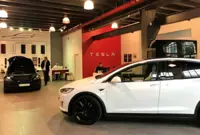Rich or not, young and old, hip urbanites and rural dwellers alike: Norwegians, including Crown Prince Haakon, are increasingly switching to electric cars. — AFP Relaxnews
Some want to save the planet even in the afterlife.
In Oslo, a funeral home offers the dearly departed a trip to their final resting place in an eye-catching electric hearse, as electric vehicles take over the roads in the Scandinavian country.
"Many people drive an electric car in Norway and some want to leave this planet in a green way," says undertaker Odd Borgar Jolstad, demonstrating his customised Tesla in the tranquillity of the Grefsen cemetery overlooking the capital.
"So this is our little contribution to the environment," he smiles.
Rich or not, young and old, hip urbanites and rural dwellers alike: Norwegians, including Crown Prince Haakon, are increasingly switching to electric cars. The choice is especially green in this country, where most of the electricity produced is environmentally friendly, derived from hydro power.
From the affordable Nissan Leaf to the luxurious Tesla, more than half of new cars sold in the country in March were run on batteries rather than fuel.
"We will probably pass 50%" for the full year as well, says Christina Bu, secretary general of the Norwegian EV (electric vehicle) Association.
That is unprecedented in Norway and elsewhere, and the share is expected to increase further with the arrival of new models offering ever-increasing range.
Growing green awareness?
While the Nordic country is the biggest oil producer in Western Europe, it is officially aiming for all new cars sold to be zero emission by 2025.
"There are of course some challenges but it's definitely possible," Bu says.
To meet that goal, Norway will have to switch into higher gear for its recharging infrastructure, setting up stations along motorways, in rural zones and private parking lots, she notes.
But do Norwegians, who owe their immense wealth to North Sea oil, really have a greater environmental conscience than others? Probably not - the speedy electrification of the country's automotive fleet is attributed mainly to generous state subsidies.
Electric cars are almost entirely exempt from the heavy taxes imposed on petrol and diesel cars, which makes them competitively priced.
A VW Golf with a standard combustion engine costs nearly 334,000 kroner (RM160,700), while its electric cousin the e-Golf costs 326,000 kroner (RM157,000) thanks to a lower tax quotient.
Per Kolner, a retired business leader in his late 60s, is already on his fifth electric car.
He bought his first one because of the high cost of city road tolls.
"First it was actually the cost," he says, standing in front of his spanking new Tesla 3.
"Tolls kept popping up all around and on my way to and from my work every day I had to pass them four times, which made about US$10 (RM41) to US$15 (RM61) a day just in toll fees."
Electric cars have long been able to whiz through toll plazas without paying.
Social costs
But even denizens of this wealthy state grumble about the cost.
As Norway's car fleet grows increasingly cleaner and is therefore subjected to fewer taxes, the state's revenue from car-related taxes is now €2.6bil (RM12.07bil) lower than in 2007, according to the government.
Some benefits have already disappeared: road tolls are no longer completely free, just reduced, and the same goes for parking and recharging stations in public parking lots.
Electric cars are also allowed to use bus lanes freely. However, as their large numbers slow down bus traffic, in the most congested parts of Oslo they can use bus lanes only if there are at least two or more people in the vehicle.
The duration of the exemptions – guaranteed until 2021 – is increasingly being questioned.
"We subsidise electric vehicles in Norway because they have somewhat lower CO2 emissions than conventional cars," notes Bjart Holtsmark, a researcher at Statistics Norway.
"But there are a lot of other social costs related to car driving: congestion, accidents, noise and so forth. And with respect to those types of problems there are very small differences related to these types of cars."
According to Norway's biggest insurer Gjensidige, new electric cars are involved in 20% more accidents involving personal injuries than diesel models, in part because of their faster acceleration.
Meanwhile, electric cars are attracting more than just private consumers, with commercial clients following the trend as well as taxis and postal and fire services, among others.
But on Oslo's streets, the electric hearse still raises eyebrows.
"Often, when we drive around, people walking by – and even some drivers – take out their phones to take pictures," says Jolstad, wearing a dark suit as befits the job he has held for three decades. – AFP Relaxnews





